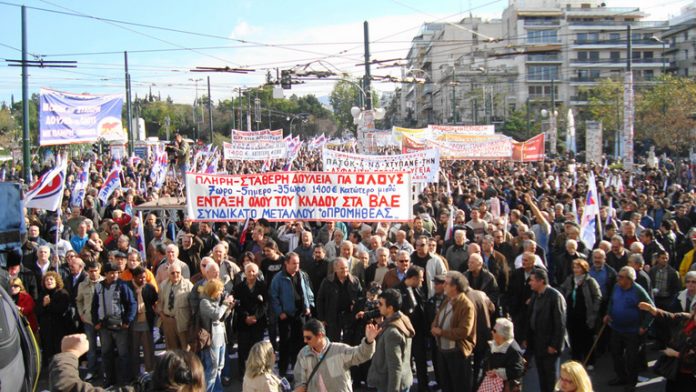THOUSANDS of Greek workers and students took part in rallies and demonstrations last Thursday in a one-day general strike called by several trade unions against the policies of the social-democratic government.
The strike was boycotted by the GSEE (Greek TUC), who support the government.
In a despicable statement the GSEE leaders said that ‘We have not called a strike’ and warned workers that if they strike they won’t be ‘protected’, insinuating that workers will be then liable to prosecution by the courts and their bosses!
Indeed, Greek shipowners succeeded in declaring the 24-hour strike of seafarers as ‘illegal’ by the courts.
The courts also declared ‘illegal’ the strike organised by the casinos and betting firms’ trade unions.
This did not stop workers and students demonstrating through the Athens city centre shouting anti-government slogans.
The Greek Communist Party’s trade union section PAME held a 10,000-strong rally and demonstration with mass participation of construction, food industry, garment, local government engineering and print workers. Short-contract public sector workers, who are in the forefront of the fight against sackings and for permanent jobs for all, also took part along with thousands of students.
Earlier, Evagelia Drakou, a ‘stage’ cheap labour programme worker, told the rally that ‘we are at a critical time, we won’t go back now.’
Drakou spoke with a class anger castigating the government and the Greek bourgeois media for not reporting their struggles; she insisted that ‘ “stage” workers would carry on, unlike some other short-contract workers who gave up the struggle because they were given a six-months contract extension.
Lykourgos Fountoulis, another ‘stage’ worker and general secretary of his trade union at the Agriculture Development Institute, spoke to the News Line explaining why they are participating in the strike.
‘We are the workers of a new “special class”; we work at low wages without benefits, without sick pay, without social security, without pension insurance; that’s why we are in the streets.’
In a separate Athens demonstration, over 3,000 secondary school teachers, university tutors, students, shop and short-contract workers, along with left-wing parties, marched to the Vouli (Greek parliament).
Greek journalists in newspapers, TV and radio, staged a solid 100 per cent strike and none of the newspapers were printed, nor were there news or current affairs programmes broadcast on both TV and radio.
The strike-breaking leaders of the GSEE succeeded in holding back transport, bank and communication workers.
Telephone reports from other Greek cities confirmed good participation in the strike and demonstrations were held in every town and city.
It is the first time in the last 20 years or so that a general strike meets with such success independently of the GSEE bureaucrats.
In the port city of Piraeus, the largest in Greece, about 1,000 workers and students marched to the docks to offer their support to the ‘illegally’ striking seafarers.
As the strike was developing, the Athens stock exchange was diving once again following yet another relegation of the Greek economy’s standing, this time from the financial agency Standard & Poor.
Borrowing money will be now harder and more expensive for the government of Prime Minister Yiorghos Papandreou who, this week, sent his Finance Minister on a tour of London, Paris and Berlin begging for money and political and financial backing.
But it is clear from statements made by both the German Chancellor Angela Merkel and the president of Germany’s central bank Axel Weber, that Papandreou’s social-democratic government won’t get any assistance unless he unleashes the most brutal class war against the Greek working class.
And so the Greek Finance Minister Yiorgos Papakonstantinou had to agree last Wednesday in Berlin to a Stability and Development plan involving wage cuts and further public spending cuts.
The details have been kept secret by the Greek government but the workers and students already know what they mean.
But the Greek working class’ anger and determination is not matched by their present political and trade union leaders.
Last Tuesday, on the eve of the strike, the general secretary of the Stalinist Greek Communist Party, Mrs Aleka Paparigha, and the leader of the Coalition of the Radical Left, Alexis Tsipras, sat in a Greek political leaders’ meeting called by the Greek Prime Minister Papandreou to discuss how to fight economic corruption, along with the leaders of the Conservative party and the racist party LAOS.
The Revolutionary Marxist League (RML), the Greek Section of the International Committee of the Fourth International, participated in the strike’s demonstrations, and called for a public sector alliance to fight sackings and for permanent full-time jobs for all, for a united front of all Greek workers, and for a workers’ and small farmers’ socialist government to replace the capitalist government.
The RML urged workers and students to join it in building a mass revolutionary party and a new trade union leadership.
